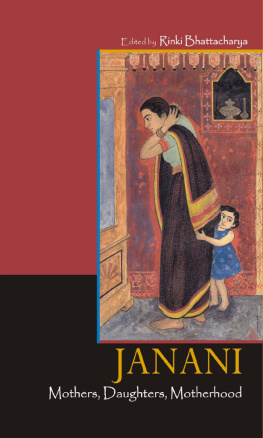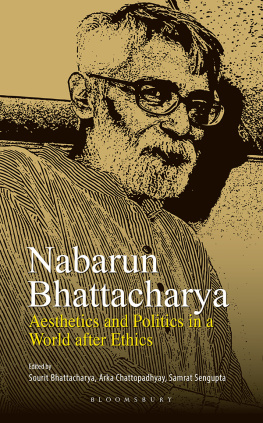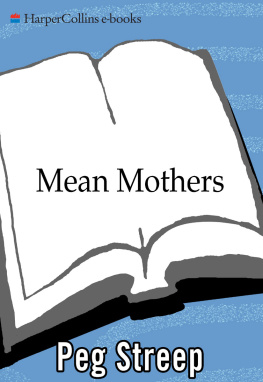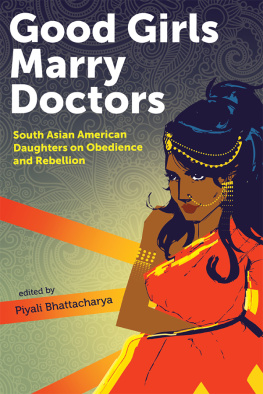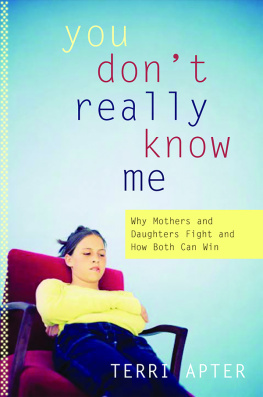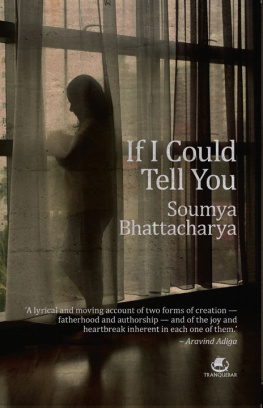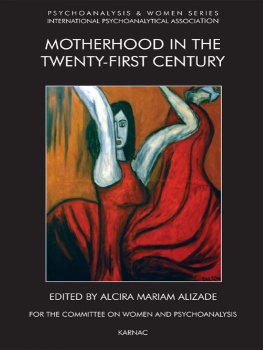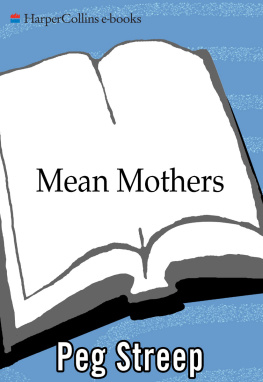Rinki Bhattacharya - Janani - Mothers, Daughters, Motherhood
Here you can read online Rinki Bhattacharya - Janani - Mothers, Daughters, Motherhood full text of the book (entire story) in english for free. Download pdf and epub, get meaning, cover and reviews about this ebook. year: 2006, publisher: Sage Publications India Pvt, Ltd, genre: Non-fiction. Description of the work, (preface) as well as reviews are available. Best literature library LitArk.com created for fans of good reading and offers a wide selection of genres:
Romance novel
Science fiction
Adventure
Detective
Science
History
Home and family
Prose
Art
Politics
Computer
Non-fiction
Religion
Business
Children
Humor
Choose a favorite category and find really read worthwhile books. Enjoy immersion in the world of imagination, feel the emotions of the characters or learn something new for yourself, make an fascinating discovery.
- Book:Janani - Mothers, Daughters, Motherhood
- Author:
- Publisher:Sage Publications India Pvt, Ltd
- Genre:
- Year:2006
- Rating:5 / 5
- Favourites:Add to favourites
- Your mark:
- 100
- 1
- 2
- 3
- 4
- 5
Janani - Mothers, Daughters, Motherhood: summary, description and annotation
We offer to read an annotation, description, summary or preface (depends on what the author of the book "Janani - Mothers, Daughters, Motherhood" wrote himself). If you haven't found the necessary information about the book — write in the comments, we will try to find it.
Janani - Mothers, Daughters, Motherhood — read online for free the complete book (whole text) full work
Below is the text of the book, divided by pages. System saving the place of the last page read, allows you to conveniently read the book "Janani - Mothers, Daughters, Motherhood" online for free, without having to search again every time where you left off. Put a bookmark, and you can go to the page where you finished reading at any time.
Font size:
Interval:
Bookmark:


If you want to know who the real heroes of world history are, just look at the mothers.
Peter Hoeg, Danish author
Come, please. Her condition is critical. No, do not rush. But you need to come. The almost-expected telephone call came from the Calcutta Hospital. My brother, Abhijit, his wife and I left our breakfast table and rushed to the ICU where Mother had been lying for over a fortnight, fighting for her life. Before stepping out of the lift, my brother said, I dont want her to die now. I stroked his cheeks, Let her go, Abhijit, I said gently.
We entered the hospital room. She was already goneshe must have already passed away when they called. My brother and his wife, who had come from abroad to be by her side during her last days, were looking intently at her face, grief-stricken and overwhelmed.
So, she is gone, I thought. I remembered the days when I used to sit by her bedside, and she used to fondly stroke my arms with her feeble hands, and bless me again and again. She was so happy that I looked after her and cared for her. Did she know what I used to think? Could anyone guess? While everyone tried to feed her rasogollas (which she loved), make her smile and take every care so that she could live longer, I alone sat and prayed, Take her away, dear God!, this was no living. Living was humiliating. To depend on others for feeding, bathing and changing soiled beds, again and again! I did not want such a living for myself and not for my mother either. Everyone would have been shocked had I told them what I thought, while caressing her face. They all said, She is with us. She talks, she jokes, she eats. The ayahs were happy, they were getting their salaries and the patient was undemanding, my mashima was comfortable with her sister for company, my sister Tapati was pleased that she still had a baper bari. Pronoti, the youngest and the sweetest of us three sisters, believed our mother was a protecting angel. All our other relatives wished her to get well and live long out of the respect they bore for my father. I alone wished her dead!
Did I then not love my mother? I had always thought that I did not love her enough. I only did my duty towards her, being the eldest child and the best placed to do so. She was almost ninety, thin, emaciated and ugly, without a single tooth, with shrunken skin, swollen eyes and was a victim of Parkinsons.
I remember her when she and I were both younger. No, I did not love her, but I was proud of her. She was very beautiful and smart, had graduated from Indraprastha College, Delhi University, in 1934, with a gold medal (which she bequeathed to me) for standing first among girls and had mathematics and economics as her subjects. Brought up in a well-to-do mamabari (my grandmother was just a 14-year-old girl at the time of my mothers birth) along with mamas, all of them very bright and vivacious, my mother, Kalyani, was spoilt and loved by all. The whole world seemed to be at her feet. She was happy and had all she thought she wanted.
Then she got married, and made her first and crucial mistake. She fell head over heels in love with my father. He was a rather remarkable man in every sense, I agree, but as our ancient Shastras wisely warn, sarbam atyantam garhitamtoo much of anything is bad. To love your husband may be all right, but to be overpowered by that love and forget yourself totally, give up your individuality, is no good. My mother did that. She lived like a shadow of my father. No, not because she was a devout Hindu, or because the Shastras prescribed a woman to be patibrata. Religion, based on so-called Shastras, and my mother were poles apart. But love is love. And while loving our father, she never pursued further studies, or thought of carving out a life, or developing hobbies of her own. We two sisters came along and shenot a besotted but sensible mothertaught us at home, sewed our dresses, cooked in the niramish kitchen for my thakurma and pishima who always stayed with us, in the niramish kitchen and looked after the streams of guests who thronged our home. I remember while we were five of usthree sisters and our parentsour father was posted in Kurseong in the district of Darjeelingwe had 36 guests at the same time at our house. Everyone in the extended family seemed to be in poor health and in need of a change of air. My mother, always a gentle, soft-spoken personnever shouted, never lost her temper, never talked much and never expressed any annoyance. Simple fooddal, one sabji and a fish currywas served to all. Beds were made on madurs and satranchis on the floor, pillows hastily made with old clothes, pushed into old cushion covers and thick kanthas sewn with old sarees (blessed be that craft!) were offered to protect them from the cold. Those who camemainly our relationsate, slept, roamed about in the hills, and were unanimous in their praise of my father. His generosityhe was generoushis charming manners, they were charming indeed, his witty conversation, he was a gifted conversa-tionalistdelighted all. The elders blessed him and the young, admired him. No one said much to my mother or about her.
We two sisters, Tapati and I (Pronoti came 10 years later and Abhijit even later) by mutual consent divided our parents between us. Baba was mine, MaTapatis. As sisters we were very close and loving. I do not think Baba treated us differently from each other (Tapati may think otherwise), but I always felt my mother did. Perhaps because Tapati was weaker of the two, was thin and often sick, perhaps because our relatives favoured me above her, Ma was protective of Tapati. Once when we were in Patuakhali in the district of Barisal, my mother stitched a shirt and a pair of trousers exclusively for Tapati. I watched her for days sewing with great care and with great love, only for Tapati (so it seemed to me). When it was done, a beautiful set, I could take it no more. As she left the room, I brought out her pair of scissors and made an inch-deep cut in the red-striped shirt. My mother came back all smiles, ready to take the trial fitting of my sister and her expression changed. Rarely did I see such anger on her face. She gave me a tight slap, and said, CHHI! You are jealous. Jealousy is a sin. That was the first and the last time my mother ever slapped me. I was six. I was shocked. No, I was sure I did not love her.
Yet, I was proud. My friends were envious. You have a graduate mother who teaches you. That is why you are so good at maths. Yes, I would proudly assert, She was first in maths in Delhi University, dont you know? Your translations are so good, and prcis of such high standard, my classmates would comment, in the small-town schools I studied in. I would accept the compliment and smugly say, My mother teaches me. She studied in Delhi and is a gold medallist from Delhi Universitydont you know? As if it was their duty to know!!
My mother had a considerable number of qualities for me to brag about to my friends. She was an outstanding swimmer, who crossed the Ganga at Berhampore in Murshidabad (where her parents stayed) in record time and was a gifted athlete who delighted in playing badminton (tennis had not gained popularity then) with my fathers male friends as partners or opponents, a woman of outstanding physical courage and the coolest of nerves, that was evident every time there was a family crisis, be it a riot (during those red days in the 1940s) or my fathers serious illness. Yet, instead of developing any of her skills, she chose to become a housewife. Did she really choose? Or, did she just give in to circumstances? I believe thinking was not her favourite pastime. Eating was, as was going out. There was not much scope for either, but she managed to do a little of both.
Font size:
Interval:
Bookmark:
Similar books «Janani - Mothers, Daughters, Motherhood»
Look at similar books to Janani - Mothers, Daughters, Motherhood. We have selected literature similar in name and meaning in the hope of providing readers with more options to find new, interesting, not yet read works.
Discussion, reviews of the book Janani - Mothers, Daughters, Motherhood and just readers' own opinions. Leave your comments, write what you think about the work, its meaning or the main characters. Specify what exactly you liked and what you didn't like, and why you think so.

